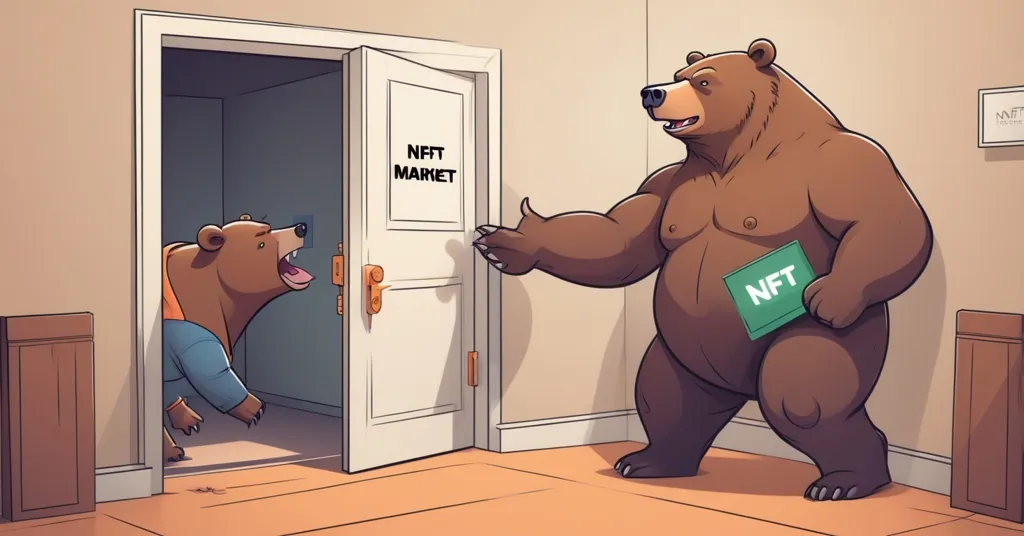Bybit Exits NFT Market Amid 50% Sales Drop: Strategic Shift or Market Signal?

Bybit Exits NFT Market Amid Declining Sales: A Strategic Pivot or a Sign of the Times?
Bybit, a leading cryptocurrency exchange, has announced the closure of its NFT marketplace, Inscription marketplace, and Initial DEX Offering (IDO) platform, effective April 8, 2025. This move comes as the NFT market faces a significant downturn, with sales dropping over 50% in Q1 2025 compared to Q4 2024.
- Bybit shuts down NFT, Inscription, and IDO platforms
- Closure effective April 8, 2025
- Declining NFT sales prompt strategic pivot
Bybit’s Strategic Pivot
In a bold move that echoes the broader challenges facing the NFT sector, Bybit has decided to exit the non-fungible token (NFT) market. An NFT is a unique digital asset that represents ownership or proof of authenticity of a specific item or piece of content, often stored on a blockchain. Bybit’s decision to close its NFT marketplace, Inscription marketplace, and Initial DEX Offering (IDO) platform, effective from April 8, 2025, marks a significant shift in its strategy. The exchange aims to refine its future plans and enhance user experience, a move that could be seen as a necessary step to stay ahead in the ever-evolving crypto landscape.
Bybit’s Inscription marketplace deals with Bitcoin Ordinals, which are a way to inscribe data onto individual satoshis on the Bitcoin blockchain. An IDO, on the other hand, is a method of token distribution on decentralized exchanges. Bybit’s decision to shut down these platforms is a clear signal that the exchange is focusing on areas that promise better user experiences and align more closely with its business goals.
NFT Market Trends
The NFT market has been experiencing a notable downturn, with sales in the first quarter of 2025 plummeting by over 50% compared to the last quarter of 2024. This decline reflects a broader trend of declining interest and activity in the sector. Market saturation, regulatory concerns, and shifts in investor interest are among the factors contributing to this downturn. The closure of other prominent NFT marketplaces such as X2Y2, Quidd, and MakersPlace in early 2025 further underscores the challenges facing the industry.
Despite the overall market decline, some NFT collections like Pudgy Penguins, Doodles, and Milady Maker have shown resilience, with sales increases of 13%, 41%, and 58% respectively. This suggests that while the broader market struggles, certain niches continue to thrive, highlighting the diverse nature of the NFT ecosystem.
User Guidance and Recommendations
Bybit has advised its users to transfer their assets to alternative platforms before the discontinuation date. For those holding NFTs, Bybit recommends moving them to OpenSea, Magic Eden, and Blur. OpenSea is one of the largest NFT marketplaces, known for its wide range of digital assets. Magic Eden and Blur are also popular platforms for NFT trading, offering various features and user experiences.
For users with Bitcoin Ordinals, Bybit suggests transferring them to Unisat and Magic Eden. Unisat is a marketplace specifically designed for trading Bitcoin Ordinals, while Magic Eden also supports this asset class. IDO participants should transfer their airdropped tokens to Bybit Web3 seed phrase or private key wallets to ensure they retain access to their assets.
The Future of NFTs
The NFT market’s shift from a speculative frenzy to a focus on utility is a trend that cannot be ignored. Charu Sethi from Unique Network points out that the future of NFTs lies in their integration into gaming, AI, fan engagement, and content authentication. This shift in utility could be a silver lining for the sector, even as overall sales decline.
“As part of our commitment to adjusting our product roadmap and enhancing user experience, Bybit Web3 will discontinue its NFT Marketplace, Inscription Marketplace, and IDO product pages on April 8, 2025, at 16:00 (UTC).” – Bybit Web3
Despite the downturn, the resilience of certain NFT collections and the shift towards utility-focused applications offer hope for a more sustainable future. The rise in average Bitcoin NFT prices, from $63.45 in 2023 to $633.24 in Q1 2025, despite a decline in sales volume, suggests that demand for specific high-value NFTs remains strong.
Broader Implications
Bybit’s exit from the NFT market is not just a reflection of current market conditions but also a strategic pivot towards more promising areas. The exchange’s focus on enhancing user experience and refining its product offerings could set a precedent for other players in the crypto space. As the industry continues to evolve, the ability to adapt and innovate will be crucial for survival and growth.
While the closure of Bybit’s NFT-related services might seem like a setback for the NFT market, it’s important to remember that the crypto world is all about disruption and adaptation. Bybit’s move could be seen as a necessary step to stay ahead in a rapidly changing landscape, where only the most agile and user-focused platforms will thrive.
Counterpoints and Critical Thinking
Some critics argue that Bybit’s decision to exit the NFT market is a sign of weakness rather than strategic foresight. They point out that the exchange could have invested more in developing its NFT offerings to weather the current downturn. Others believe that the focus on utility-driven NFTs is overhyped and that the market will continue to be driven by speculation.
On the other hand, Bybit’s move could be seen as a smart play in the long game of crypto. By focusing on user experience and refining its product offerings, Bybit is positioning itself to capitalize on future trends and technologies. In a world where decentralization and innovation are king, Bybit’s decision to exit the NFT market is a reminder that even the most established players must adapt to survive.
As we navigate these turbulent waters, it’s clear that the NFT market is at a crossroads. The decline in sales and the closure of marketplaces are stark reminders of the volatility inherent in the crypto space. Yet, the resilience of certain NFT collections and the shift towards utility-focused applications offer hope for a more sustainable future.
Key Questions and Takeaways
- Why is Bybit shutting down its NFT marketplace?
Bybit is shutting down its NFT marketplace to adjust its product roadmap and enhance user experience, indicating a strategic shift in focus.
- When will Bybit’s NFT services be discontinued?
Bybit’s NFT services will be discontinued on April 8, 2025, at 16:00 (UTC).
- What platforms does Bybit recommend for NFT trading?
Bybit recommends OpenSea, Magic Eden, and Blur for NFT trading.
- What should users do with their Bitcoin Ordinals?
Users should transfer their Bitcoin Ordinals to other marketplaces like Unisat and Magic Eden.
- How have NFT sales performed in early 2025?
NFT sales in Q1 2025 have dropped by over 50% compared to Q4 2024, indicating a significant decline in the market.
- What other NFT marketplaces have closed down recently?
X2Y2, Quidd, and MakersPlace have also closed down their NFT marketplaces in early 2025.
In the world of crypto, where decentralization and innovation are king, Bybit’s decision to exit the NFT market is a reminder that even the most established players must adapt to survive. As we move forward, the focus on utility and user experience will likely shape the future of NFTs and the broader blockchain ecosystem.



